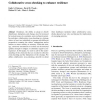Free Online Productivity Tools
i2Speak
i2Symbol
i2OCR
iTex2Img
iWeb2Print
iWeb2Shot
i2Type
iPdf2Split
iPdf2Merge
i2Bopomofo
i2Arabic
i2Style
i2Image
i2PDF
iLatex2Rtf
Sci2ools
CTW
2007
2007
Collaborative cross-checking to enhance resilience
Resilience, the ability to adapt or absorb disturbance, disruption, and change, may be increased by team processes in a complex, socio-technical system. In particular, collaborative cross-checking is a strategy where at least two individuals or groups with different perspectives examine the others’ assumptions and/or actions to assess validity or accuracy. With this strategy, erroneous assessments or actions can be detected quickly enough to mitigate or eliminate negative consequences. In this paper, we seek to add to the understanding of the elements that are needed in effective cross-checking and the limitations of the strategy. We define collaborative cross-checking, describe in detail three healthcare incidents where collaborative crosschecks played a key role, and discuss the implications of emerging patterns.
Collaborative | Cross-checking | CTW 2007 | Strategy |
Related Content
| Added | 13 Dec 2010 |
| Updated | 13 Dec 2010 |
| Type | Journal |
| Year | 2007 |
| Where | CTW |
| Authors | Emily S. Patterson, David D. Woods, Richard I. Cook, Marta L. Render |
Comments (0)

